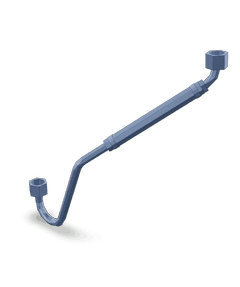Introduction
The Cummins 3978420 Flexible Hose is a component designed for use in commercial trucks. It facilitates the transfer of fluids between various parts of the vehicle, contributing to the overall efficiency and reliability of the truck’s operations 2.
Basic Concepts of Flexible Hoses
Flexible hoses are utilized in automotive systems to connect different components that require fluid transfer. Unlike rigid hoses, flexible hoses can bend and move with the vehicle, accommodating the dynamic nature of automotive systems. They are commonly used for transporting fluids such as coolant, fuel, and hydraulic fluid, providing a more adaptable solution compared to their rigid counterparts 1.
Purpose of the 3978420 Flexible Hose
The 3978420 Flexible Hose is specifically engineered to connect systems within a truck that necessitate fluid transport. It ensures that fluids are efficiently transferred between components, supporting the truck’s operational systems. This hose is integral to maintaining the fluid dynamics within the truck, contributing to its performance and longevity 2.
Key Features
The 3978420 Flexible Hose is characterized by several key features that enhance its functionality. These include its material composition, which is designed to withstand the pressures and temperatures associated with truck operations. Its flexibility allows it to adapt to the movements of the truck, while its durability ensures long-term performance. The hose is also designed with specific specifications to ensure compatibility and efficiency within the truck’s system 2.
Benefits
The advantages of the 3978420 Flexible Hose include its improved flexibility, which allows for better adaptation to the truck’s movements. This flexibility reduces the risk of leaks, as the hose can accommodate shifts and vibrations without compromising its integrity. Additionally, the hose’s enhanced durability contributes to its longevity, making it a reliable component for truck operations. Its design also facilitates ease of installation, ensuring that it can be efficiently integrated into the truck’s system 2.
Installation Considerations
When installing the 3978420 Flexible Hose, it is important to follow guidelines and best practices to ensure proper fitting and securement. This includes verifying compatibility with the truck’s system to prevent issues such as leaks or inefficient fluid transfer. Proper securing methods should be employed to maintain the hose’s position and integrity within the system 2.
Troubleshooting Common Issues
Common problems associated with flexible hoses, such as leaks, kinks, and degradation, can impact the truck’s performance. Troubleshooting these issues involves identifying the source of the problem and taking appropriate steps to address it. This may include inspecting the hose for signs of wear or damage, ensuring proper fitting and securement, and replacing the hose if necessary 1.
Maintenance Tips
Regular maintenance practices are recommended to ensure the longevity and reliable performance of the 3978420 Flexible Hose. This includes conducting inspections at specified intervals to check for signs of wear, damage, or leaks. Replacement guidelines should be followed to ensure that the hose is replaced before it reaches the end of its service life, maintaining the efficiency and safety of the truck’s system 2.
Cummins Overview
Cummins Inc. is a well-established company in the commercial truck industry, known for its wide range of products and strong reputation. With a history of innovation and quality, Cummins has become a trusted name in the industry, providing reliable components and systems for commercial vehicles 2.
Role of Part 3978420 Flexible Hose in Engine Systems
The part 3978420 Flexible Hose is an essential component in the efficient operation of various engine systems, particularly when integrated with the filter and full flow oil system.
In the context of the filter system, the flexible hose serves as a vital conduit that facilitates the movement of fluids between different components. It ensures a secure and leak-free connection, allowing for the consistent flow of contaminants to the filter media. This uninterrupted flow is necessary for the effective capture of particles, which helps maintain the cleanliness of the engine’s internal components 2.
When paired with the full flow oil system, the flexible hose plays a significant role in maintaining the lubrication circuit. It connects the oil pump to the filter and other critical engine parts, ensuring that oil is distributed evenly throughout the engine. This consistent oil flow is essential for reducing friction, dissipating heat, and protecting moving parts from wear and tear 2.
The flexibility of the hose also accommodates the natural vibrations and movements within the engine compartment, which helps prevent stress on connections and reduces the risk of leaks. This adaptability is particularly important in high-performance engines where components are subject to greater stresses and movements 2.
Conclusion
The integration of the 3978420 Flexible Hose within these systems enhances the reliability and efficiency of the engine, contributing to its longevity and performance. Regular maintenance and proper installation are key to ensuring the hose’s effectiveness and the overall performance of the truck’s engine system 2.
SPECIFICATIONS
RECOMMENDED PARTS
* Variable geometry turbocharger and electronic actuator repairs are not eligible to be claimed as over-the-counter under New or ReCon parts warranty for parts installed after October 1, 2018.
* Diesel Oxidation Catalyst (DOC), Diesel Particulate Filter (DPF), Selective Catalyst Reduction (SCR) catalyst, and Electronic Control Module (ECM) repairs are not eligible to be claimed as over-the-counter under New or ReCon parts warranty for parts installed after January 1, 2020.
* These restrictions are only applicable to New parts and ReCon parts coverages for the components listed above sold to a customer in the US or Canada. All other coverages are excluded. All other regions are excluded.









